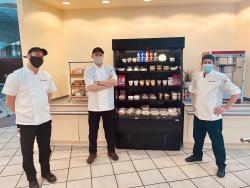Our Impact

Herman Miller is bringing all of its food service in-house, hiring displaced culinary talent, and sourcing more local, sustainable food to serve its West Michigan employees. The company has hired four chefs and will grow the team to over 20 food service members – many of whom recently lost their service industry jobs due to COVID-19 lockdowns.
According to the MRLA, about 5,600 restaurant operators in Michigan say it is unlikely they'll be in business within the next six months. That equals 33% of the state's restaurants.
“That’s a lot of people on the sidelines, and we’re excited to welcome this talented, passionate group of culinary experts to our company,” said Shannon Bell, Herman Miller Facilities Services Manager. “When you think about Herman Miller, you don’t think about food, but it’s a big part of who we are.”
Herman Miller’s West Michigan food service began in the 1970s in a response to a national energy crisis – an incentive for employees to utilize corporate ridesharing and reduce the necessity of driving to lunch to save energy. Today, its West Michigan food service capabilities span across five buildings and six cafes. They serve a total of 2,400 team members per day compared to approximately 4,000 before COVID-19 lockdowns. While many of the office-based employees are still working from home, its manufacturing team members have been back on-site since April.
Not only do these culinary experts have a new career at Herman Miller, but they are also making the lives better for their fellow employees and communities. Take a look inside the Kitchen:
Sourcing local, sustainable, traceable food
The team of chefs is closely involved in the vendor selection process working with local, regional, and national vendors that match Herman Miller’s brand and sustainability practices. Along the supply chain, they can also easily and completely trace all food back to its source, tracking environmental impact measures such as fuel efficiency, emissions, and more.
Offering healthier affordable food options
Good food makes people happier, healthier, and more productive. By fueling its employees with healthy food options created within the kitchens, the employees have already noted an increase in morale and energy. And, by keeping the services in-house, the company can control pricing, so employees don’t need to sacrifice healthy options for budget concerns.
Serving the community through food recovery
The food services team works to be as efficient as possible when preparing food, but when there are leftovers, they reach out to a local nonprofit, Community Action House, that picks up the surplus food a redistributes it to those in need.
Creating experiences and connection
No matter how long an employee has for lunch, the cafés have always been more than just a place to order and eat food. They’re a setting for connection, conversation, and collaboration. The food service team aims to create an elevated experience for anyone who enters the cafés.
Culinary creativity
Herman Miller is a company known for its design expertise. But that design-thinking spans beyond its products into its operational practices. Food service is no exception – culinary creativity is welcomed and celebrated. The team spent months developing menus and programs fit for a variety of customers. From salad dressing and soup to its now-famous chicken tenders, as much as possible is created from scratch.
“The experience in the café has completely transformed,” said Bell. “At the end of the day, it’s all about people taking care of people, and that’s just what Herman Miller is good at.”